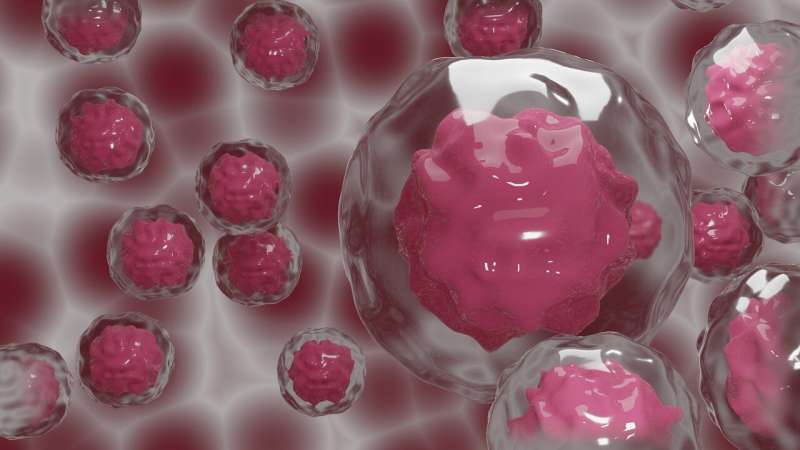Genes and immune cells predict immunotherapy success in bladder cancer

Sets of genes associated with resistance to immunotherapy in patients with metastatic urothelial cancer of the bladder have been identified and validated by researchers at Mount Sinai. In a study published in Clinical Cancer Research, the team uncovered gene signatures representing adaptive immunity and pro-tumorigenic inflammation that were responsible for sensitivity or resistance to immune checkpoint inhibitors, drugs that help the body's immune system recognize and attack cancerous cells.
"These findings enabled us to identify potential biomarkers in patients who are less likely to respond favorably to immune checkpoint inhibitors, as well as new combination therapeutic approaches that might overcome such resistance in those patients," says senior author Matthew Galsky, MD, Professor of Medicine (Hematology and Medical Oncology), Icahn School of Medicine at Mount Sinai.
Significantly, the findings demonstrated that the balance between adaptive immunity and pro-tumorigenic inflammation in individual tumor microenvironments—reflected by these two gene signatures—best predicted response or resistance to immune checkpoint blockade. The researchers then identified specific cells in the tumor microenvironment associated with resistance to immune checkpoint blockade, and potential targets for therapies designed to overcome resistance.
For decades, standard treatment for metastatic urothelial cancer of the bladder has been platinum-based chemotherapy, though the landscape has changed dramatically in recent years with the advent of PD-1 and PD-L1 immune checkpoint inhibitors. This therapeutic breakthrough has had its limits, though: only 20 to 25 percent of patients with bladder cancer respond to treatment, which has set off an intense hunt by biomedical scientists for mechanisms of resistance.
"Using RNA sequencing data from two clinical trials, and single cell RNA sequencing data from a cohort of bladder tumors, we identified a subset of genes and immune cells associated with adaptive immunity and improved checkpoint inhibitor outcomes, and a subset associated with pro-tumorigenic inflammation and resistance to PD-1/PD-L1 blockade in patients with urothelial cancer," Dr. Galsky says.
The research is among the first to use both bulk and single-cell RNA sequencing of human bladder tumors to study resistance to immunotherapy. Bulk sequencing examines the mix of genes expressed by every individual cell within a tumor, while single-cell sequencing—a technique increasingly important in cancer research—zeroes in on gene expression by each individual cell, which yields unprecedented knowledge of the complexity and heterogeneity of cells that comprise tumors.
Through this combination of RNA sequencing, researchers learned, for example, that the balance of adaptive immunity and pro-tumorigenic inflammation within the tumor microenvironment can determine PD-1/PD-L1 resistance in urothelial cancer. Adaptive immunity is the body's ability to recognize and respond to specific foreign invaders, while pro-tumorigenic inflammation is a counterproductive response of the immune system that can ultimately fuel growth and progression of cancer.
"If the tumor microenvironment is weighted more toward adaptive immunity, there's a better chance of positive outcomes from immunotherapy," explains Dr. Galsky, who is Associate Director of Translational Research and Co-Director of the Bladder Cancer Center of Excellence at The Tisch Cancer Institute. "On the other hand, if the tumor microenvironment is leaning toward pro-tumorigenic inflammation, then PD-1/PD-L1 checkpoint inhibitors alone are unlikely to be successful, and new combination approaches may be needed."
Mount Sinai researchers coined the term "2IR Score" to measure that balance.
From its comprehensive RNA analysis, the team identified not just potential biomarkers to treatment resistance, but a specific subset of white blood cells known as myeloid phagocytic cells that are linked to pro-tumorigenic inflammation and, hence, resistance. As such, they serve as prospective targets for therapeutic approaches that combine immunotherapies like PD-1/PD-L1 blockade with drugs designed to overcome the resistance conferred by myeloid cells. Those novel combination strategies are now being incorporated into future clinical trials.
"Our research shows that a specific cellular state of myeloid cells underlying pro-tumorigenic inflammation account for resistance to immune checkpoint blockade in a very large percentage of patients with urothelial bladder cancer," Dr. Galsky says. "This is an important finding which we believe can lead to a better focus and direction for developing effective combination therapies—and not just for bladder cancer, but other types of tumors, as well".
More information: Li Wang et al. Myeloid Cell–associated Resistance to PD-1/PD-L1 Blockade in Urothelial Cancer Revealed Through Bulk and Single-cell RNA Sequencing. Clinical Cancer Research DOI: 10.1158/1078-0432.CCR-20-4574




















